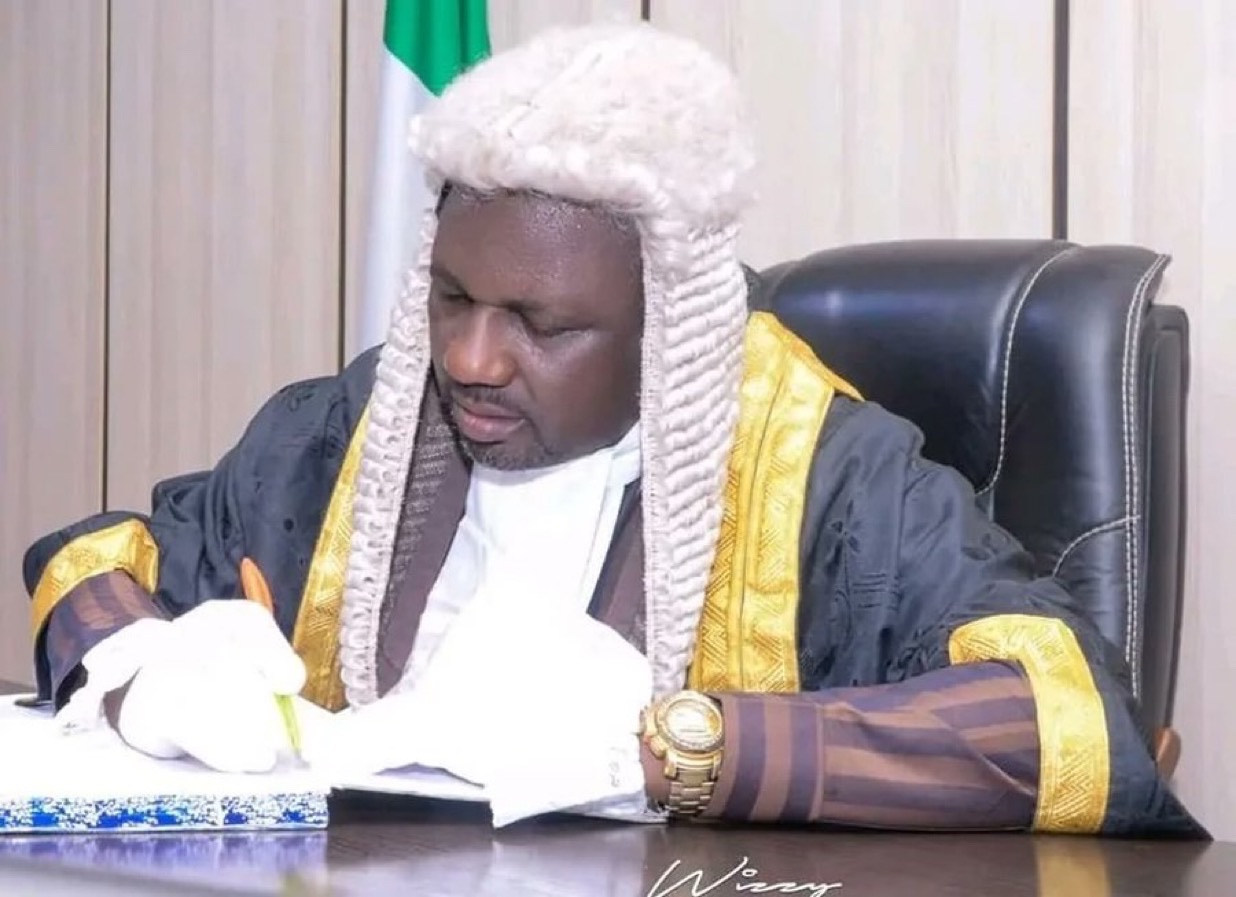
Shockwaves in Benue Politics as Speaker Hyacinth Dajoh Abruptly Resigns Just 48 Hours After Suspending Four Lawmakers

In a dramatic twist that has left the Benue State political landscape reeling, Speaker of the Benue State House of Assembly, Hyacinth Dajoh, has tendered his resignation just 48 hours after wielding the gavel to suspend four lawmakers in what many described as a bold but controversial move. The sudden exit of the Speaker, who only recently consolidated his influence in the Assembly, has sparked heated debate, confusion, and speculations over the real reasons behind his decision to bow out so abruptly, raising questions about the balance of power in the state and the internal battles raging within the legislature.
The announcement of Dajoh’s resignation reportedly filtered into the public domain late Sunday evening, catching even his closest allies off guard. Many insiders within the Assembly corridors revealed that there had been no prior indication that the Speaker, known for his assertive leadership style, was contemplating stepping down, particularly after what appeared to be a decisive show of authority in suspending four lawmakers over alleged misconduct. The move to suspend those lawmakers had already ignited controversy, with critics accusing the Speaker of using the hammer of suspension to silence dissenting voices, while his supporters insisted it was a necessary measure to restore order and discipline in the Assembly.
Observers had believed that Dajoh’s firm stance in suspending the lawmakers was a signal of his tightening grip on legislative proceedings, yet his sudden resignation has turned that narrative upside down. The timing has raised eyebrows, with analysts suggesting that his decision to vacate his position may not be unconnected with mounting political pressure, behind-the-scenes deals, or even subtle threats from powerful forces both within and outside the Assembly. As one political commentator put it, “Resigning two days after suspending four lawmakers sends a message that something deeper is happening behind closed doors. This is not a coincidence—it is either pressure, compromise, or both.”
For many in Benue State, the development represents yet another episode in the state’s turbulent political history, where high-stakes maneuvering and sudden shifts of allegiance have often defined the trajectory of leadership. Dajoh, who ascended to the speakership amidst intense political competition, had been seen as a figure determined to assert independence for the legislature, but his tenure, though impactful, has now ended in what some describe as an anticlimactic fashion. Already, speculation is rife that his resignation may have been part of a larger political deal aimed at stabilizing the Assembly and preventing a full-blown crisis that could paralyze governance in the state.
The suspended lawmakers, who had vowed to resist what they called an “unconstitutional and undemocratic” action, are now emboldened by the Speaker’s exit, with expectations that their suspension may soon be reversed. Some of them have publicly expressed that Dajoh’s resignation is a vindication of their stance and a signal that the fight for their reinstatement has already tilted in their favor. Others have taken to social media to celebrate what they term as a “victory for democracy and rule of law,” framing the Speaker’s downfall as the inevitable consequence of what they describe as an abuse of power.
The news has also triggered mixed reactions from political stakeholders across the state. While some leaders have applauded Dajoh for what they called a “courageous decision to step aside for the sake of peace and unity,” others have criticized him for lacking the resilience expected of a Speaker, arguing that his sudden resignation portrays instability in the legislative arm of the government. Citizens, on their part, have taken to various forums to voice their opinions, with many lamenting that such instability in the Assembly ultimately distracts from the core issues of governance, including security, economic development, and infrastructure, which remain pressing challenges for the people of Benue.
Beyond the immediate drama, attention has now shifted to the question of succession: who takes over the speakership, and under what terms? Already, political heavyweights are said to be positioning their loyalists for the coveted seat, with backroom negotiations intensifying. The power vacuum left by Dajoh’s departure has opened a fresh round of contestation, and it remains to be seen whether a consensus candidate will emerge or whether the Assembly will plunge into a prolonged struggle for control. For Governor Hyacinth Alia and the state’s political establishment, the developments present both an opportunity and a challenge—an opportunity to reset the legislative agenda and a challenge to manage the competing interests that have now been unleashed.
For Dajoh himself, his resignation marks a turning point in a career that had seemed poised for greater heights. The man who once stood at the heart of legislative power in Benue is now faced with the reality of political recalibration. Whether his resignation will fade into history as a fleeting controversy or resurface in the future as a strategic masterstroke depends on what unfolds in the coming weeks. Some political analysts argue that by stepping down voluntarily, he has preserved his political relevance and avoided being forced out in a humiliating manner. Others, however, believe that he has weakened his standing by appearing to yield under pressure, a perception that could haunt him in future political battles.
What remains undeniable is that the resignation of Hyacinth Dajoh as Speaker just two days after suspending four lawmakers has reshaped the dynamics of the Benue State House of Assembly and deepened public interest in the intrigues of legislative politics. In a state where political maneuvering often mirrors the high-stakes battles of national politics, the sudden resignation is more than just a personal decision—it is a reflection of the constant push and pull between power, loyalty, and survival. For the people of Benue, who have watched these developments with keen eyes, the hope is that the turbulence within the Assembly will not derail the pursuit of policies and actions that directly impact their lives.
As the dust begins to settle, one thing is clear: Hyacinth Dajoh’s resignation will be remembered not merely as the departure of a Speaker but as a moment of reckoning for Benue politics. It has exposed the fragility of power, the volatility of alliances, and the enduring truth that in politics, as in life, nothing is certain until it is over. The Assembly now stands at a crossroads, and the choices made in the days ahead will determine not only the fate of its members but also the trajectory of governance in the state. Until then, the echoes of this dramatic resignation will continue to reverberate, fueling speculation, analysis, and debate in equal measure across the political spectrum.


